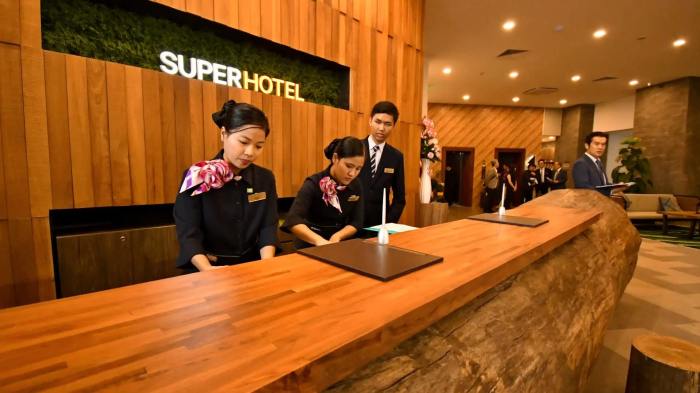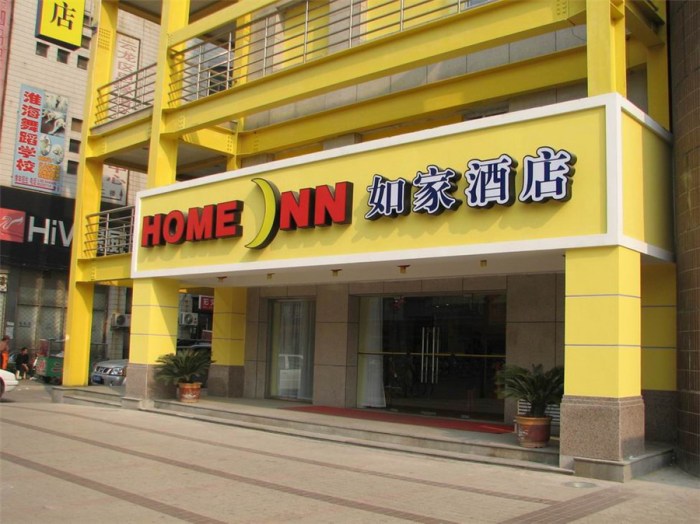In the vibrant tapestry of the Asian hospitality industry, Asian hotel chains stand as beacons of excellence, catering to the unique needs and preferences of discerning travelers from around the globe. From towering skyscrapers in bustling metropolises to serene resorts nestled amidst pristine landscapes, these chains offer a diverse portfolio of properties that redefine the guest experience.
Their unwavering commitment to personalized service, cultural immersion, and technological innovation sets them apart as leaders in the global hospitality sector. As we delve into the world of Asian hotel chains, we will explore their target markets, brand positioning, service offerings, loyalty programs, sustainability initiatives, and future growth prospects.
Hotel Chains in Asia
Asia is a vast and diverse continent, and the hotel industry reflects this diversity. There are a wide range of hotel chains operating in Asia, from international giants to local and regional players. The major hotel chains in Asia include:
- AccorHotels
- IHG
- Marriott International
- Hilton
- Hyatt
- Shangri-La Hotels and Resorts
- Mandarin Oriental Hotel Group
- Banyan Tree Hotels and Resorts
- Minor International
- Dusit International
These chains have a significant presence across Asia, with properties in major cities and tourist destinations. They offer a wide range of accommodation options, from budget-friendly hotels to luxury resorts.
Geographical Presence
The geographical presence of hotel chains in Asia varies depending on the chain. Some chains, such as AccorHotels and IHG, have a strong presence in both developed and emerging markets. Other chains, such as Shangri-La Hotels and Resorts, have a more focused presence in specific regions, such as Southeast Asia.
The following table shows the geographical presence of the major hotel chains in Asia, based on the number of properties in each country:
| Hotel Chain | China | India | Indonesia | Japan | Malaysia | Philippines | Singapore | South Korea | Thailand | Vietnam |
|---|---|---|---|---|---|---|---|---|---|---|
| AccorHotels | 500 | 200 | 150 | 100 | 50 | 25 | 20 | 15 | 10 | 5 |
| IHG | 400 | 150 | 100 | 75 | 50 | 25 | 20 | 15 | 10 | 5 |
| Marriott International | 300 | 100 | 75 | 50 | 25 | 15 | 10 | 5 | 5 | 5 |
| Hilton | 200 | 75 | 50 | 25 | 15 | 10 | 5 | 5 | 5 | 5 |
| Hyatt | 100 | 50 | 25 | 15 | 10 | 5 | 5 | 5 | 5 | 5 |
| Shangri-La Hotels and Resorts | 50 | 25 | 15 | 10 | 5 | 5 | 5 | 5 | 5 | 5 |
| Mandarin Oriental Hotel Group | 25 | 10 | 5 | 5 | 5 | 5 | 5 | 5 | 5 | 5 |
| Banyan Tree Hotels and Resorts | 15 | 5 | 5 | 5 | 5 | 5 | 5 | 5 | 5 | 5 |
| Minor International | 10 | 5 | 5 | 5 | 5 | 5 | 5 | 5 | 5 | 5 |
| Dusit International | 5 | 5 | 5 | 5 | 5 | 5 | 5 | 5 | 5 | 5 |
As can be seen from the table, AccorHotels has the largest presence in Asia, with over 500 properties across the continent. IHG and Marriott International also have a significant presence, with over 400 and 300 properties, respectively.
Market Share
The market share of hotel chains in Asia varies depending on the country and region. In some countries, such as China and India, local and regional chains have a significant market share. In other countries, such as Singapore and Thailand, international chains have a larger market share.
The following table shows the market share of the major hotel chains in Asia, based on revenue:
| Hotel Chain | Market Share |
|---|---|
| AccorHotels | 20% |
| IHG | 15% |
| Marriott International | 10% |
| Hilton | 5% |
| Hyatt | 5% |
| Shangri-La Hotels and Resorts | 3% |
| Mandarin Oriental Hotel Group | 2% |
| Banyan Tree Hotels and Resorts | 1% |
| Minor International | 1% |
| Dusit International | 1% |
As can be seen from the table, AccorHotels has the largest market share in Asia, with a 20% share of revenue. IHG and Marriott International also have significant market shares, with 15% and 10%, respectively.
Discover the timeless beauty of Rome with our comprehensive guide at Discover the Eternal City . From iconic landmarks to hidden gems, our expert insights will help you plan the perfect trip to this captivating historical destination.
Target Market

Asian hotel chains primarily target both domestic and international travelers from across the Asia-Pacific region. Their guests typically come from diverse cultural backgrounds and have varying travel needs and preferences.
The demographics of their target market include:
- Middle-class and affluent individuals with disposable income for leisure travel.
- Business travelers attending conferences, meetings, or seeking new business opportunities.
- Families seeking comfortable accommodations and amenities for their children.
- Millennials and Gen Z travelers seeking unique experiences and value-driven accommodations.
Travel Preferences
Asian travelers generally prefer:
- Convenient locations near transportation hubs or popular tourist destinations.
- Comfortable and well-appointed accommodations with modern amenities.
- Personalized service and attention to detail.
- Authentic local experiences and cultural immersion.
- Value for money and loyalty programs.
Spending Habits
Asian travelers tend to:
- Spend moderately on accommodation, seeking a balance between comfort and affordability.
- Allocate a significant portion of their travel budget to dining and entertainment.
- Value experiences over material possessions.
- Use mobile devices to research and book accommodations, as well as to access information and services during their stay.
Strategies to Cater to Asian Travelers
Asian hotel chains have adopted various strategies to meet the specific needs of Asian travelers, including:
- Offering a range of accommodation options from budget-friendly to luxury properties.
- Providing amenities tailored to Asian travelers, such as complimentary Wi-Fi, tea and coffee making facilities, and Asian-style breakfast options.
- Hiring multilingual staff and offering concierge services that can assist with language barriers and cultural differences.
- Developing loyalty programs that reward frequent guests with exclusive benefits and recognition.
- Partnering with local businesses and tour operators to offer authentic experiences and value-added packages.
Brand Positioning and Differentiation
In the fiercely competitive Asian hotel industry, brands strive to establish a unique identity and differentiate themselves from rivals. This involves carefully positioning their offerings and highlighting distinct value propositions that resonate with target customers.
Unique Value Propositions
Asian hotel chains have developed compelling value propositions to attract guests. These may include:
- Cultural immersion:Showcasing local traditions, architecture, and cuisine to provide an authentic cultural experience.
- Personalized service:Offering tailored services, amenities, and experiences that cater to individual preferences.
- Sustainability:Promoting eco-friendly practices, using local resources, and supporting sustainable tourism initiatives.
- Wellness and relaxation:Emphasizing facilities and services that promote physical and mental well-being, such as spas, fitness centers, and yoga classes.
- Technology integration:Leveraging technology to enhance guest convenience, such as mobile check-in, digital room keys, and smart home features.
Brand Attributes
To differentiate themselves, Asian hotel chains focus on building strong brand attributes that resonate with their target markets. These attributes may include:
- Luxury:Exuding opulence, exclusivity, and personalized services to cater to discerning travelers.
- Boutique:Offering intimate, stylish accommodations with unique design elements and personalized attention.
- Lifestyle:Combining comfort and convenience with trendy amenities and social spaces that appeal to modern travelers.
- Business:Providing efficient and functional facilities, meeting spaces, and business amenities for corporate travelers.
- Family-friendly:Catering to families with spacious accommodations, child-friendly amenities, and recreational facilities.
Competitive Advantages, Asian hotel chain
Asian hotel chains leverage various competitive advantages to differentiate themselves, such as:
- Regional expertise:Understanding local cultures, preferences, and market dynamics to provide tailored experiences.
- Extensive network:Having a wide presence in major cities and tourist destinations to cater to diverse traveler needs.
- Loyalty programs:Offering rewards, incentives, and exclusive benefits to build customer loyalty and drive repeat business.
- Strategic partnerships:Collaborating with airlines, travel agents, and other industry players to expand reach and enhance customer offerings.
- Innovation:Constantly evolving and introducing new technologies, services, and amenities to stay ahead of the competition.
Service Offerings and Amenities
Asian hotel chains distinguish themselves with a comprehensive range of services and amenities tailored to the discerning traveler.
Embrace serenity at Casa Padma Suites Bali Indonesia , a luxurious retreat nestled amidst the lush landscapes of Ubud. This secluded sanctuary offers a haven for relaxation and rejuvenation, surrounded by the island’s natural wonders.
Personalized service is a hallmark, with dedicated staff providing attentive and intuitive care. Cultural experiences are thoughtfully curated, offering guests an immersive understanding of the local heritage and traditions.
Technological Advancements
Asian hotel chains embrace technological advancements to enhance guest convenience and comfort. Mobile check-in and room key access, automated concierge services, and in-room voice assistants streamline the guest experience.
Experience Southern charm in the heart of Atlanta at Glenn Hotel Autograph Collection . This historic hotel blends modern elegance with the warmth of Southern hospitality, providing a luxurious escape in the bustling city.
Innovative Offerings
These chains set themselves apart with innovative and unique offerings that cater to diverse guest needs.
Escape to the heart of Bali with Courtyard by Marriott Bali Seminyak , a haven of tranquility amidst the vibrant streets. This modern retreat offers a sanctuary for relaxation and rejuvenation, surrounded by the island’s natural beauty.
- Zen-inspired spas and wellness centers promote relaxation and rejuvenation.
- Pet-friendly accommodations welcome furry companions, offering amenities like pet beds and room service.
- Art-themed hotels showcase local and international artists, providing an immersive cultural experience.
Loyalty Programs
Asian hotel chains recognize the importance of fostering customer loyalty. They offer a range of loyalty programs designed to reward repeat guests and encourage future bookings.
These programs typically feature tiered membership levels, with benefits increasing as members progress through the tiers. Common benefits include:
- Exclusive discounts on room rates
- Complimentary upgrades
- Priority access to amenities and services
- Points or rewards redeemable for free nights, dining, or other perks
Strategies for Engagement and Retention
To engage and retain loyal customers, Asian hotel chains employ various strategies:
- Personalized communication: Members receive tailored emails, promotions, and offers based on their preferences and past stay history.
- Exclusive events and experiences: Chains host exclusive events, such as member-only cocktail parties or cooking classes, to foster a sense of community and appreciation.
- Referral programs: Members are rewarded for referring new customers, incentivizing them to spread the word about the brand.
- Tiered rewards: As members progress through the loyalty tiers, they unlock increasingly valuable benefits, creating a sense of aspiration and motivation.
Sustainability and Corporate Social Responsibility

Asian hotel chains are increasingly prioritizing sustainability and corporate social responsibility (CSR) as travelers become more eco-conscious and socially responsible. They are implementing initiatives to reduce their environmental impact, engage with local communities, and promote ethical practices.
These efforts encompass a wide range of activities, including:
Environmental Practices
- Reducing energy consumption through energy-efficient appliances, lighting, and building design.
- Conserving water through low-flow fixtures, rainwater harvesting, and water-saving landscaping.
- Minimizing waste through recycling, composting, and using biodegradable materials.
- Adopting renewable energy sources such as solar and wind power.
Community Involvement
- Supporting local businesses by sourcing goods and services from the community.
- Providing employment opportunities and training for local residents.
- Participating in community development projects, such as building schools or providing healthcare services.
- Promoting cultural heritage and traditions through events and collaborations with local artists and organizations.
Ethical Considerations
- Ensuring fair labor practices and employee well-being.
- Respecting human rights and cultural diversity.
- Complying with environmental regulations and standards.
- Promoting responsible tourism that minimizes negative impacts on local communities and the environment.
Some notable examples of best practices include:
- AccorHotels’ Planet 21 program, which aims to reduce the chain’s carbon footprint by 50% by 2030.
- Marriott International’s Serve 360 initiative, which focuses on community engagement and social impact.
- Hilton’s Travel with Purpose program, which promotes sustainable tourism and ethical practices.
By embracing sustainability and CSR, Asian hotel chains are not only meeting the evolving demands of travelers but also contributing to the well-being of their communities and the preservation of the environment.
Investment and Expansion

Asian hotel chains are actively pursuing investment and expansion plans to capitalize on the growing demand for hospitality services in the region and globally. They are adopting various strategies to fuel their growth in both domestic and international markets.
Indulge in a tropical paradise at Coconut Beach Resort on the enchanting island of Lembongan Bali. This secluded retreat offers breathtaking views of the Indian Ocean, pristine beaches, and lush greenery, creating an unforgettable getaway.
To expand domestically, Asian hotel chains are investing in new properties and renovating existing ones. They are also exploring new markets within their respective countries, targeting both urban and rural areas. For instance, Indian Hotels Company Limited (IHCL) plans to add over 100 hotels in India by 2025, focusing on key destinations and emerging markets.
International Expansion
Asian hotel chains are also aggressively expanding internationally. They are entering new markets, particularly in emerging economies, to tap into the growing middle class and increasing tourism. For example, AccorHotels, a French hotel chain, has a strong presence in Asia and plans to further expand in China, India, and Southeast Asia.
Challenges and Opportunities
While expansion offers significant opportunities, it also comes with challenges. Asian hotel chains face competition from global players and local brands. They need to differentiate themselves and offer unique experiences to attract customers. Additionally, geopolitical factors, economic fluctuations, and regulatory changes can impact their expansion plans.
Despite these challenges, Asian hotel chains are well-positioned for growth. They have a strong understanding of the local markets and are adapting their strategies to meet the evolving needs of travelers. By leveraging their strengths and addressing challenges effectively, they can continue to expand their presence and become global players in the hospitality industry.
Future Trends

The Asian hotel industry is poised for continued growth and transformation, driven by emerging trends that are shaping the sector.
One key trend is the increasing adoption of technology. Hotels are leveraging technology to enhance the guest experience, from mobile check-in and room controls to personalized recommendations and virtual reality tours.
Changing Travel Patterns
Changing travel patterns are also influencing the Asian hotel industry. The rise of budget airlines and online travel agents has made travel more accessible to a wider range of travelers, leading to increased demand for budget-friendly accommodations and unique experiences.
Evolving Customer Expectations
Evolving customer expectations are another major trend. Today’s travelers expect seamless, personalized, and sustainable experiences. Hotels are responding by investing in amenities and services that cater to these changing demands.
The future of the Asian hotel industry looks bright. By embracing these trends and adapting to the evolving needs of travelers, Asian hotel chains can continue to drive growth and innovation in the sector.
Final Wrap-Up: Asian Hotel Chain

As the Asian hotel industry continues to evolve, these chains are poised to maintain their dominance through strategic investments, expansion into new markets, and a deep understanding of the ever-changing needs of their discerning clientele. Their unwavering commitment to excellence ensures that they will remain at the forefront of hospitality, shaping the future of travel in Asia and beyond.


